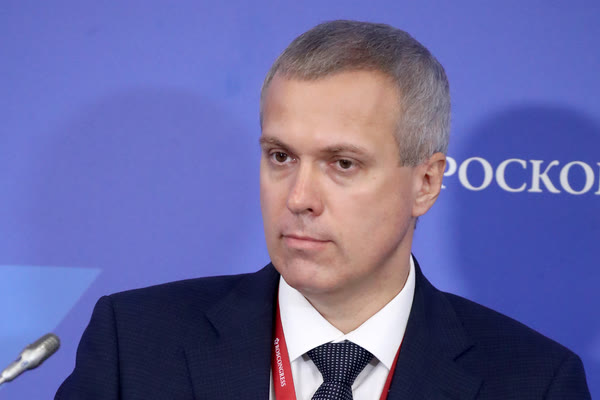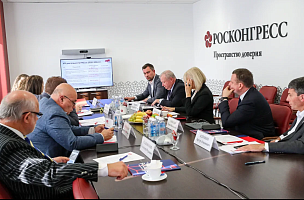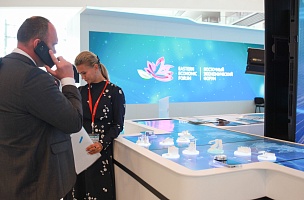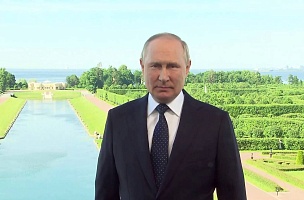KEY CONCLUSIONS
The Northern Sea Route is a promising transport corridor for the entire world
“Russia is a very important country for us, it ties up the Far East – the place where most of the goods in the world are produced – and Europe. The Northern Sea Route is a very important and convenient thing. We are very interested in this new route; it is a connection with China,” Sultan Ahmed Bin Sulayem, Group Chairman, Chief Executive Officer, DP World.
“The ice is melting, and a chance for an ice-class ship to successfully pass the Northern Sea Route, even without icebreaker escort, are growing constantly. Earlier this year, a previously unthinkable thing happened, when in January a special Arctic ice-class gas carrier sailed east along the Northern Sea Route, and safely passed through its most difficult eastern section, thus proving that sailing was possible even in January,” Sergei Ivanov, Special Representative of the President of the Russian Federation on Environmental Protection, Ecology and Transport.
Development of transport must not have a negative impact on the environment
“Compliance with the strictest environmental standards is important. We understand the crucial thing: transport has a tremendous impact on the global climate situation. We understand that since the Northern Sea Route is shorter than the traditional one, ships that run on fossil fuels account for less СО2 emissions due to higher speed and shorter distance on this route,” Kirill Komarov, First Deputy General Director, Director of the Development and International Business Unit, ROSATOM State Atomic Energy Corporation.
“When talking about the Northern Sea Route, we inevitably have to consider the environment. The transport industry is generally one of those that are inextricably and inevitably linked with the environment. The contribution of cars to the overall carbon dioxide emissions is rather high. For example, in Moscow, transport accounts for 90% of all toxic emissions into the atmosphere,” Sergei Ivanov, Special Representative of the President of the Russian Federation on Environmental Protection, Ecology and Transport.
PROBLEMS
Imperfect infrastructure in the regions of the Russian Far East and the Arctic
“For the Ministry [for the Development of the Russian Far East, Ed.], the issue of transport infrastructure is a very sensitive one. Last year we could have transported an additional 15 million tonnes of cargo, but we did not due to the limited transport capacity,” Gadzhimagomed Huseynov, First Deputy Minister of the Russian Federation for the Development of the Far East and the Arctic.
“How to deliver products manufactured in other regions to the Northern Sea Route for export? As of today, the Russian transport infrastructure is not adjusted to this. Generally speaking, <...> when considering the logistics of transit, to a degree, Russia itself undermines the competitiveness of Russian manufacturers in the changing structure of the economy. The way the transport system of Russia is developing does not help the task of developing non-resource exports,” Dmitry Konov, Chairman of the Management Board, SIBUR Holding.
Congestion of existing traffic routes
“The port is now working above maximum capacity; the volume of transshipment load is more than 126%. We understand that the key factor is the market conditions; the explosive growth of rates leads to shippers redirecting their routes to the Trans-Siberian Railway,” Andrey Severilov, Chairman of the Board, Far-Eastern Shipping Company.
“The main task is to modernize the Transsib, the eastern part of the Baikal–Amur Mainline, because that is where we see major problems. The route is needed, but what will be transported through it 30 years from now? My long-term forecast for coal is pessimistic because Europe has already abandoned coal, and China has announced plans to drastically reduce its thermal coal consumption,” Sergei Ivanov, Special Representative of the President of the Russian Federation on Environmental Protection, Ecology and Transport.
SOLUTIONS
Enhancing digitalization in transport
“We have gone deep into digital. Now, not only we get things done via electronic transfer of documents, but through automated procedures. We have 20% of all imports and 40% of all exports released in a fully automatic mode, without a customs officer. All transit is processed electronically. One of the tasks is to facilitate and accelerate the international trade. It is a priority task, we are applying various digital solutions to it,” Ruslan Davydov, First Deputy Head, Federal Customs Service of Russia.
“A number of innovations in the field of digitalization could significantly help the development of international transit through our country. First of all, electronic navigation seals that are installed on containers allow not only to track their location, but also to ensure that the shipments are intact,” Kirill Bogdanov, Deputy Minister of Transport of the Russian Federation.
Creating a transport corridor between Russian regions; betting on container transportation
“We raised a major issue of making an alternative transport corridor available. The economy is changing. The cost of transporting one container through the Suez Canal has more than doubled over the past six months. And today there is economic appeal in having an alternative container line in the Northern Sea Route. We are actively involved in this together with Rosatom, and as a pilot project, we are going to launch container transportation between Russian ports starting next year,” Gadzhimagomed Huseynov, First Deputy Minister of the Russian Federation for the Development of the Far East and the Arctic.
“Global GDP has doubled over the past 30 years due to a strong division of labor between regions, which has led to an increase in international logistics. The structure of transportation has changed, and containerization has taken place. Globally, there are about 20 million containers that are moved between the world’s regions. The tasks in transport logistics that Russia sets for itself are designed to build a transit corridor between regions,” Dmitry Konov, Chairman of the Management Board, SIBUR Holding.
For more information, visit the Roscongress Foundation’s Information and Analytical System at roscongress.org.






